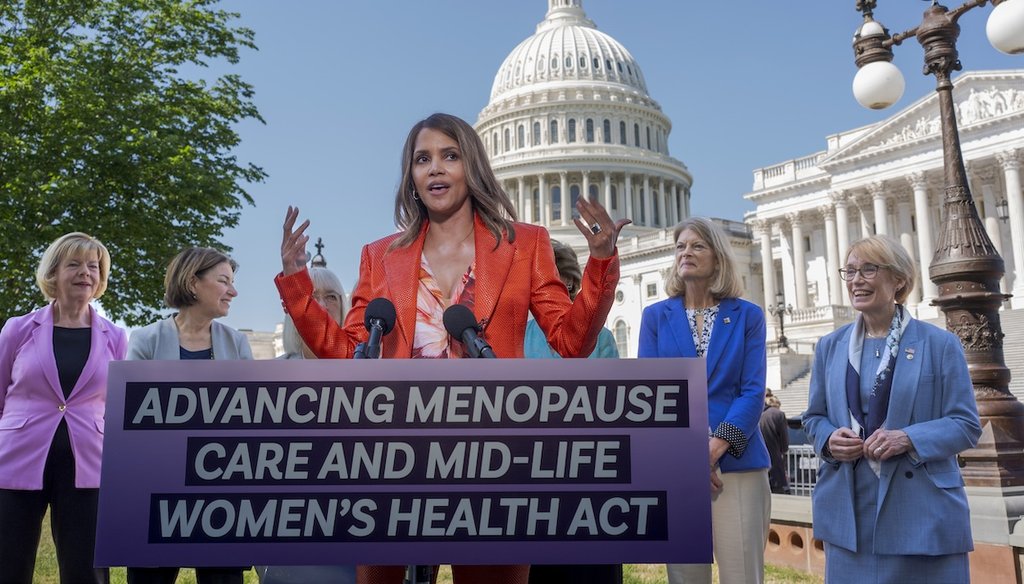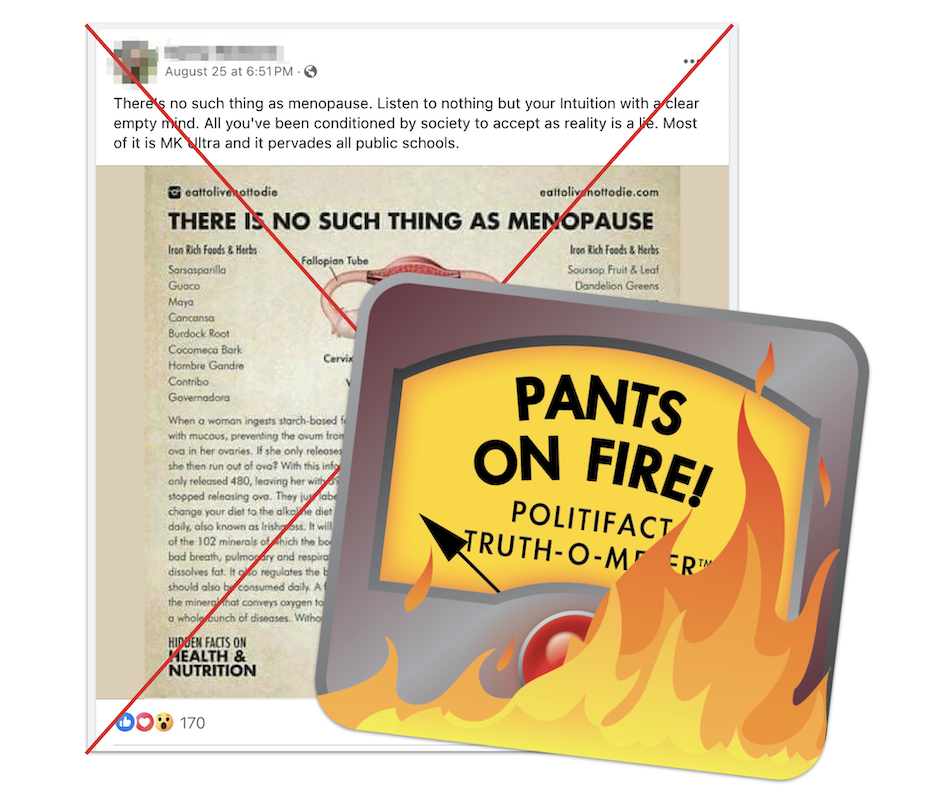Stand up for the facts!
Our only agenda is to publish the truth so you can be an informed participant in democracy.
We need your help.
I would like to contribute

Actor and women's health activist Halle Berry joins senators as they introduce new legislation to boost federal research on menopause, at the Capitol in Washington, May 2, 2024. (AP)
Fact-checking the Pants on Fire! claim that ‘there’s no such thing as menopause’
If Your Time is short
-
Menopause exists. Numerous clinics, groups of health care professionals and medical research entities confirm this and generally define menopause the point at which a woman has naturally gone 12 months without a menstrual period.
-
Menopause occurs naturally when ovaries stop making reproductive hormones such as estrogen and stop releasing eggs for fertilization.
-
It takes time to reach menopause, and most people experience symptoms during that transition. The period is clinically known as menopausal transition or perimenopause but it’s often popularly described as "going through menopause." Symptoms include irregular periods, hot flashes, vaginal dryness, insomnia, night sweats and mood changes.
Menopause. The word likely calls to mind both aging and its common symptoms, such as hot flashes, changing moods and difficulty sleeping.
But for one Facebook user, the entire concept is fake — the result of social conditioning.
"There’s no such thing as menopause," read the Aug. 25 post, which included an image making the same claim. "Listen to nothing but your Intuition with a clear empty mind. All you’ve been conditioned by society to accept as reality is a lie."
This post was flagged as part of Meta’s efforts to combat false news and misinformation on its News Feed. (Read more about our partnership with Meta, which owns Facebook and Instagram.)
This claim is inaccurate. Numerous clinics, groups of health care professionals and medical research organizations say menopause exists, and generally define it as the point at which a woman has naturally gone 12 months without a menstrual period.
Sign up for PolitiFact texts
Dr. Somi Javaid, an OB-GYN and member of the medical advisory board of Let’s Talk Menopause, a group focused on menopause education and health care advocacy, said the claim reflected a "long history of women being dismissed and overlooked in the field of medicine."
"Menopause is an inevitable stage of life, one that every woman will experience if fortunate enough to live that long," Javaid said. "It is a phase we can and should acknowledge, diagnose, treat, and ultimately celebrate."

(Screenshot from Facebook)
Among various organizations, definitions are broadly similar with slight variations.
-
The American College of Obstetrics and Gynecologists: "Menopause is the time in your life when you naturally stop having menstrual periods. … Menopause marks the end of the reproductive years."
-
National Institute on Aging: "Menopause is a point in time 12 months after a woman's last period. The years leading up to that point, when women may have changes in their monthly cycles, hot flashes, or other symptoms, are called the menopausal transition or perimenopause."
-
Cleveland Clinic: "Menopause is a point in time when a person has gone 12 consecutive months without a menstrual period. Menopause is a natural part of aging and marks the end of your reproductive years."
-
Johns Hopkins Medicine: "When a woman permanently stops having menstrual periods, she has reached the stage of life called menopause. Often called the change of life, this stage signals the end of a woman's ability to have children."
-
World Health Organization: "Natural menopause is deemed to have occurred after 12 consecutive months without menstruation for which there is no other obvious physiological or pathological cause and in the absence of clinical intervention."
Featured Fact-check
-
Mayo Clinic: "Menopause is when periods stop for good. It’s diagnosed after 12 months without a menstrual period, vaginal bleeding or spotting."
Menopause occurs naturally when ovaries stop making reproductive hormones such as estrogen and stop releasing eggs for fertilization, according to the American College of Obstetrics and Gynecologists, Cleveland Clinic and World Health Organization.
"Estrogen receptors are present throughout the body, from head to toe. When an individual undergoes menopause, estrogen levels plummet dramatically," Javaid said. "It is now well understood that the reduction in estrogen can lead to significant symptoms, and to deny this reality is both irresponsible and dismissive of the profound impact it has on an individual's health and well-being."
That process doesn’t happen overnight. The clinical terms for the time leading up to menopause are "perimenopause" or "menopausal transition," although people commonly refer to this period as when someone is "going through menopause." That transitionary period typically begins between ages 45 and 55, the National Institute on Aging said. Johns Hopkins said perimenopause lasts about four years on average.
The average age of menopause — which is reached 12 months after a final period — in the U.S. is about 51 years old, according to Mayo Clinic. For women worldwide, the World Health Organization said natural menopause occurs "generally between 45 and 55 years."
Naturally occurring menopause isn’t even the only kind: Some people might experience something called induced menopause, which is caused by a surgery or medical treatment.
Menopause symptoms include irregular periods, hot flashes, vaginal dryness, insomnia, night sweats and mood changes, according to medical research and health organizations.
"As a general rule, one-third of women will transition into menopause with only mild symptoms or none at all," Dr. Katie Lessman, an OB-GYN, told Nebraska Medicine in 2022. "Another third will experience bothersome symptoms for a few years. The final third will have symptoms that improve but never go away."
Menopause exists and this Facebook post made a ridiculous claim. We rate it Pants on Fire!
Our Sources
Facebook post, Aug. 25, 2024
Email interview with Dr. Somi Javaid, an OB-GYN and member of the advocacy organization Let’s Talk Menopause’s medical advisory board, Aug. 30, 2024
The American College of Obstetrics and Gynecologists, The Menopause Years, accessed Aug. 30, 2024
National Institute on Aging, What Is Menopause? accessed Aug. 30, 2024
Cleveland Clinic, Menopause, accessed Aug. 30, 2024
Johns Hopkins Medicine, Introduction to Menopause, accessed Aug. 30, 2024
World Health Organization, Menopause, Oct. 17, 2022
Mayo Clinic, Menopause, Aug. 30, 2024
Nebraska Medicine, Understanding menopause: 4 common symptoms and how to treat them, Sept. 8, 2022
The North American Menopause Society, Menopause FAQs: Premature, Early, and Induced Menopause, accessed Aug. 30, 2024
Johns Hopkins Medicine, Perimenopause, accessed Aug. 30, 2024
Let’s Talk Menopause, Our Mission, accessed Aug. 30, 2024
Browse the Truth-O-Meter
More by Madison Czopek
Fact-checking the Pants on Fire! claim that ‘there’s no such thing as menopause’
Support independent fact-checking.
Become a member!
In a world of wild talk and fake news, help us stand up for the facts.
























